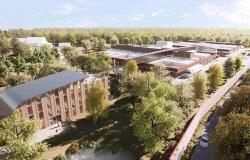The transport infrastructure landscape is undergoing a major transformation in North Africaparticularly at Morocco where a significant agreement has just been reached. THE French group NGE takes a new strategic step by winning its first railway contract in the kingdom, thus consolidating its presence in the region Middle East et North Africa. This major project, made official on December 17, 2024, is part of the extension of the railway line Kenitra-Marrakech and the development of Casablanca’s rail hubs.
The award of lot 3 to WITH represents an important milestone in the modernization of the Moroccan railway network. The work includes the rehabilitation of existing tracks, the development of platforms, drainage and various civil engineering operations. One of the key points of the project concerns the service of five strategic stations, including that of Mohammed V airport, thus strengthening connectivity between the main economic centers of the country.
The project aligns perfectly with the vision of the National Railway Office (ONCF) which is orchestrating this modernization of infrastructure. This expansion is not limited to increasing network capacity; it also prepares the ground for the future integration of the High Speed Line (LGV), while favoring an ecological approach aimed at reducing the carbon footprint of the transport sector.
For NGE, present in Morocco since 1990, this contract demonstrates a deep commitment to the development of the country. The group has gradually diversified its activities, now covering public works, the water cycle and telecommunications. The recent acquisitions of Sade and Avanzit Technologies Maroc strengthen its position as a key player in the kingdom's energy transition.
The socio-economic impact of the project is manifested at several levels. Beyond the creation of jobs during the construction and operation phases, this railway modernization stimulates Morocco's competitiveness on the international scene. The reinforced territorial network will facilitate commercial exchanges between Moroccan metropolises, while offering a sustainable alternative to road transport.
Business





